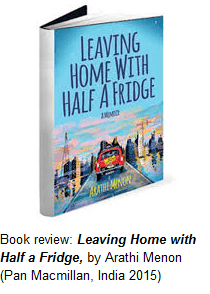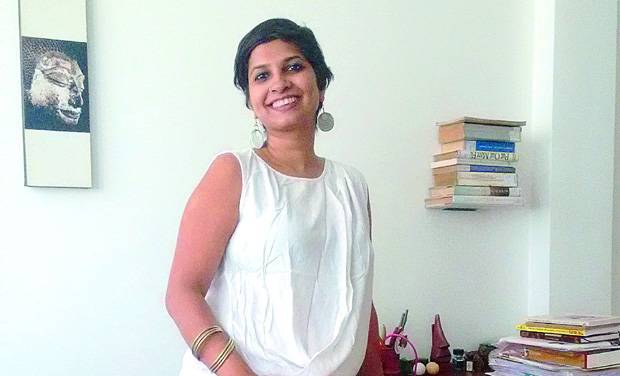A Memoir on ‘The New Normal’
By Jhelum Roy
 In a society fixated on the institution of marriage, Arathi Menon’s memoir Leaving Home with Half a Fridge is a brave attempt in rewriting the social script to accommodate what the author calls ‘the new normal’.
In a society fixated on the institution of marriage, Arathi Menon’s memoir Leaving Home with Half a Fridge is a brave attempt in rewriting the social script to accommodate what the author calls ‘the new normal’.
The author states right in the beginning this is not a story of why her marriage ended or why she chose to ask for a divorce because ‘that story isn’t important. What is, is the fact that a divorce happened and there was a survivor who lived to tell her tale’. She also goes on to affirm that there was no infidelity, no abuse, the marriage was not forced, neither was it loveless; it was just two people who couldn’t make a marital relation work and hence, decided to part ways to chase happiness on their own terms. It is in this very admission that the book sets a refreshing tone with the promise of a unique, emotional experience.
Meandering through the messy (often taxing) path of divorce, Arathi Menon’s story manages to de-stigmatize the identity of a divorcee and shift the conversation from one of failure to survival. As the author takes us through her journey from coupledom to new found singlehood, she also challenges the idea of compulsive nature of marriage. With the divorce forcing her to relearn living alone, her story shifts the conversation from the rhetoric of dependence and familiarity to one of unbridled independence, self-confidence and happiness, as she proudly affirms:
In a society like ours, ‘happiness’ is considered a dangerous thing – something that shouldn’t be indulged in; something that has the potential to ruin you. While on the other hand, endurance, stoicism and suffering are applauded and cited as examples to follow.
Ask any person on earth whether they want to be happy or unhappy and the answer would be the same. If that is so, then why should anybody stop themselves from chasing the happiness they deserve? I didn’t and that will always make me happy, no matter what happens.
Another remarkable aspect of the book is its construction of a new family, one that is not related by blood but is one of our choosing. Friends therefore play a crucial role as the support system that keeps the author up and going in her trying and crying times. Debunking the idea of family as an institution, it is friends who form bonds of solidarity and community, backing each other in times of need. Written in a language that is fresh, urban and new-age, the book creates a new ground for initiating a dialogue on love, friendship, marriage and singleness.
However, while the book breaks certain stereotypes and challenges existent moral codes, the narrative also in some ways goes on to create an alternative moral system, through which other characters are judged as not fitting into the required politics. This becomes most prominent in the chapters that lists various groups of men as players, runners or other labels and in the extremely judgmental moralist tone that she uses to chastise women choosing to be in consensual relationship with married men as being ‘used’, naive and perhaps, even spineless.
The other problem of the book is that while it starts as a memoir, in a tone that is personal, often humorous, at times heartbreaking, as the author tip-toes around the messy emotions of divorce, the book begins to adopt a didactic tone as it gathers momentum, reading almost like a self-help book towards the end with the author laying down the guidelines for a ‘divorcee’s twelve steps to start dancing again’. Whereas the author’s experiences translate into a heart-warming tale of lost love and new happiness, her adoption of the didactic tone becomes problematic as it fails to recognize that how her experiences are also very much rooted in her class, caste, socio-economic, religious background that may not be the same as other’s going through a divorce.
The book also seems too lengthy as the content, though fresh and well written, tends to get repetitive and monotonous towards the end. Nevertheless, as the title and cover art promises, In short, Arathi Menon’s first book is a simple tale of a woman finding herself after her life as she knew it changes post-divorce; it is told cautiously and simply with warmth and wit , providing a light-hearted, entertaining, quirky reading experience for her audience: the young urban middle class reader.
 The Global Calcuttan Magazine
The Global Calcuttan Magazine 